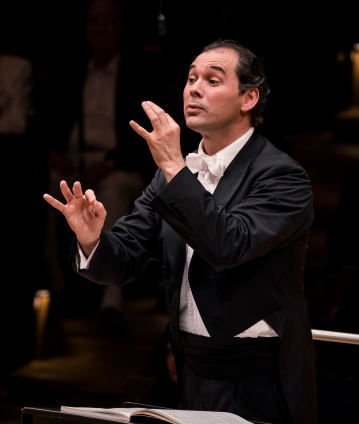Tugan Sokhiev conducts Rachmaninov, Borodin and Prokofiev

In this concert, Tugan Sokhiev, director of the Bolshoi Theatre in Moscow, conducts a Russian programme supported by the choir of his legendary opera house. While Alexander Borodin’s Polovtsian Dances and Sergei Prokofiev’s cantata Alexander Nevsky are full of primitive power and recount historical Russian war heroes, Sergei Rachmaninov’s operatic scene Spring takes an intimate private drama as its theme.
Alexander Borodin conceived his now famous Polovtsian Dances as a dance and chorus scene for his unfinished opera Prince Igor. Borodin, who enjoyed success in his main profession as a chemist, belonged to the composer circle of the so-called “Mighty Handful”, whose aim was to distance itself from the models of Western European music and establish its own Russian national style. Borodin’s opera is based on the medieval Lay of Igor’s Host and tells of the military conflicts of the Russians led by Prince Igor and the people of the Polovtsians. In his Polovtsian Dances, with its unmistakable oriental influences, the composer created an impressive scene which takes place in the war camp at night: the female voices begin tenderly, ingratiatingly, with almost unearthly beauty, while the men join them in an archaic and combative manner, finally uniting in an ecstatic final song.
A mediaeval Russian national hero is also at the centre of Sergei Prokofiev’s Cantata op. 78: Alexander Nevsky, who with his army won the decisive victory over the Teutonic Knights during the legendary battle on the frozen Lake Peipus in the 13th century. Prokofiev had originally composed the music for director Sergei Eisenstein’s 1938 historical film Alexander Nevsky. When the filming was completed, he transformed the film music into a seven-movement cantata which traces the main stages of the film’s action, especially the famous battle on the frozen lake which is considered the key scene of the entire work.
In contrast, Sergei Rachmaninov’s cantata Spring deals with a very private drama. It describes the painful feelings of a betrayed husband who, during the dark winter months, seeks revenge on his unfaithful wife and plans to kill her. However, the arrival of spring calms his anger, and he forgives his wife. In this almost operatic work, Rachmaninov, who had just overcome a severe creative crisis with the help of therapy, and moreover was also newly married, created an impressive musical panorama of human moods and emotions.
© 2019 Berlin Phil Media GmbH
Related interviews